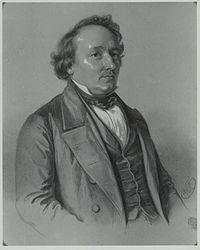Planning worship?
Check out our sister site, ZeteoSearch.org,
for 20+ additional resources related to your search.
- |
User Links
Person Results
Felix Mendelssohn-Bartholdy

1809 - 1847 Person Name: F. Mendelssohn-Bartholdi Composer of "[Wir danken dir, du gutes, du liebes Weinachtskind]" in Deutsches Liederbuch Felix Mendelssohn-Bartholdy (b. Hamburg, Germany, 1809; d. Leipzig, Germany, 1847) was the son of banker Abraham Mendelssohn and the grandson of philosopher Moses Mendelssohn. His Jewish family became Christian and took the Bartholdy name (name of the estate of Mendelssohn's uncle) when baptized into the Lutheran church. The children all received an excellent musical education. Mendelssohn had his first public performance at the age of nine and by the age of sixteen had written several symphonies. Profoundly influenced by J. S. Bach's music, he conducted a performance of the St. Matthew Passion in 1829 (at age 20!) – the first performance since Bach's death, thus reintroducing Bach to the world. Mendelssohn organized the Domchor in Berlin and founded the Leipzig Conservatory of Music in 1843. Traveling widely, he not only became familiar with various styles of music but also became well known himself in countries other than Germany, especially in England. He left a rich treasury of music: organ and piano works, overtures and incidental music, oratorios (including St. Paul or Elijah and choral works, and symphonies. He harmonized a number of hymn tunes himself, but hymnbook editors also arranged some of his other tunes into hymn tunes.
Bert Polman
Felix Mendelssohn-Bartholdy
Karl Rudolf Hagenbach

1801 - 1874 Person Name: K. R. Hagenbach Author of "Wir danken dir, du gutes, du liebes Weinachtskind" in Deutsches Liederbuch Hagenbach, Carl Rudolph, D.D., s. of C. F. Hagenbach, professor of medicine at Basel, was born at Basel, March 4, 1801. He studied at the Universities of Basel, Bonn, and Berlin. He returned to Basel in 1823 as University lecturer on Church history, was appointed ordinary professor of Church history in 1829, and died at Basel, June 7, 1874 (Koch, vii. 95, 96; Allg. Deutsche Biographie, x. 344, 345, &c). His hymns appeared principally in his Gedichte, Basel, 1846. Two are translated:—
i. Du Quell, der alle Herzen tranket. Passiontide. On Christ thirsting on the cross. 1846, as above, vol. i. p. 33, in 4 stanzas. Translated as "Thou fountain for the panting heart," by J. Kelly, 1885, p. 40.
ii. Stille halten deinem Walten. Resignation. On patient waiting on God, founded on Ps. lxii. 2. In his Gedichte, 1846, vol. i. p. 85, in 8 stanzas of 6 lines; and in Knapp's EvangelicherLieder Schatz, 1850, No. 1947. Translated as:—
Since thy Father's arm sustains thee, a free tr. of st. i.-v. in the Family Treasury, 1861, p. 293; and in the Gilman-Schaff Library of Religious Poetry, ed. 1883, p. 525, marked as tr. by “H. A. P." Included as No. 884 in Laudes Domini, N. Y., 1884. [Rev. James Mearns, M.A.]
-- John Julian, Dictionary of Hymnology
Karl Rudolf Hagenbach


 My Starred Hymns
My Starred Hymns

